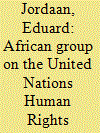| Srl | Item |
| 1 |
ID:
147232


|
|
|
|
|
| Summary/Abstract |
During the early years of the United Nations Human Rights Council, formed in 2006, the African Group obstructed efforts to scrutinize and improve human rights in specific countries, notably in the cases of Darfur and the Democratic Republic of the Congo. However, in recent years the African Group has become willing to address country-specific human rights violations, particularly in Côte d'Ivoire, Libya, and Eritrea. This article documents the African Group's shift and asks why it occurred. Against the backdrop of debates about whether the liberal international order can survive a decline in American dominance, the study of the African Group's shift grants us insight into the elements that underpin liberal internationalism. Three explanations for the African Group's shift are considered: an improvement in the domestic human rights profile of African Group members, changes to the internal dynamics of the African Group, and the influence of the United States. The article concludes that American power was decisive, a finding that raises doubt about whether the liberal international order will survive a decline in American power.
|
|
|
|
|
|
|
|
|
|
|
|
|
|
|
|
| 2 |
ID:
150537


|
|
|
|
|
| Summary/Abstract |
In the sphere of natural gas, Russia and the EU share an interdependent relationship: Russia is the single largest supplier of natural gas to the EU, while the EU is Russia’s largest gas export market. In May 2014, a deal was struck between Gazprom and the China National Petroleum Corporation to enable large-scale Russian gas exports to China. What impact could this deal have on the EU-Russia gas relationship? This article analyses Russia’s existing and proposed gas production and export infrastructure for the delivery of natural gas to Europe and to China, and the extent to which increased gas exports to the East could result in the limitation of Russian gas exports to Europe. It is concluded that, due to its dependence on new gas production in eastern Siberia and the construction of new, purpose-built pipeline infrastructure, the Gazprom-CNPC deal of May 2014 will not have a significant impact on Russia’s gas exports from north-western Siberia to the EU. The launch of talks aimed at delivering Russian gas from the Yamal Peninsula to China via the ‘western route’ opened the first possibility for Russia to balance its gas exports between East and West. However, this is unlikely to generate price competition between Europe and China, due to Gazprom’s inability to extract a ‘European’ price for its gas exports to China. This suggests that Gazprom will not re-direct significant volumes away from Europe towards China, but rather will seek additional export volumes.
|
|
|
|
|
|
|
|
|
|
|
|
|
|
|
|
| 3 |
ID:
153520


|
|
|
|
|
| Summary/Abstract |
This forum responds to recent calls to hypothesize a geopolitics of the Anthropocene by examining how our notions of geopolitics of water may shift in the context of this new and, at times, divisive framework. The Anthropocene describes the geological epoch in which humans are the dominant actor in the global environmental system and has been a concept that is not without controversy. Taking the Anthropocene as an epistemological divergence where nature can no longer be viewed as separate from humanity, this forum asks how moving away from understanding hydraulic systems as essentially stable to understanding them as unstable and profoundly influenced by humans changes our understanding ofthe geopolitics of water. Collectively the contributions to this forum illustrate that formulating a water geopolitics of the Anthropocene requires 1) moving beyond a focus on fluvial flows to consider other forms of water; 2) broadening our understanding of the actors involved in water geopolitics; 3) examining new geopolitical tactics, particularly those grounded in law; 4) engaging critically with new and emerging forms of visualization and representation in the geopolitics of water, and; 5) examining how the notion of the Anthropocene has been used towards geopolitical ends and worked to elide different positionalities.
|
|
|
|
|
|
|
|
|
|
|
|
|
|
|
|